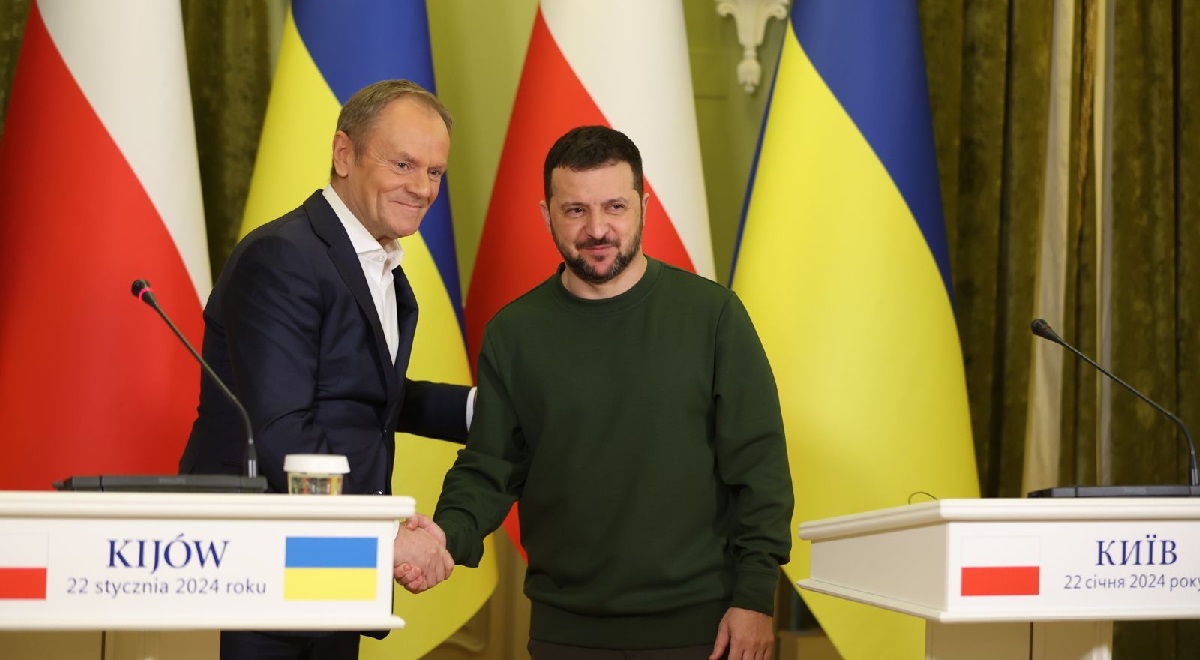Tusk said he and Zelensky agreed on "forms of cooperation" between their countries' security services and state rail carriers following two sabotage incidents on Poland's key rail corridor connecting Warsaw with the Ukrainian border.
"We agreed forms of cooperation between Polish and Ukrainian special services and state railways," Tusk wrote on X.
"The goal will be identification of people suspected of collaborating with Russia and prevention of acts of sabotage," he added.
Zelensky said Tusk shared Polish intelligence findings about recent acts of sabotage on the Polish railway, adding that information from both sides pointed to a "Russian trace."
He added that he and Tusk agreed to "set up a Ukrainian-Polish group that will work to prevent similar situations from the Russian side in the future."
 Polish Prime Minister Donald Tusk and Ukrainian President Volodymyr Zelensky meet in Kyiv in February 2024. Photo: Gov.pl, CC BY 3.0 PL <https://creativecommons.org/licenses/by/3.0/pl/deed.en>, via Wikimedia Commons
Polish Prime Minister Donald Tusk and Ukrainian President Volodymyr Zelensky meet in Kyiv in February 2024. Photo: Gov.pl, CC BY 3.0 PL <https://creativecommons.org/licenses/by/3.0/pl/deed.en>, via Wikimedia Commons
Polish officials say two Ukrainian citizens recruited by Russian intelligence carried out the attacks and fled Poland to Russia ally Belarus via the Terespol border crossing shortly afterward.
The first incident occurred over the weekend near the village of Mika, about 100 km southeast of Warsaw, where an explosive device detonated on the Warsaw-Lublin line, destroying a section of track.
In the second, a train carrying 475 passengers on the same rail line was forced into an emergency stop near the town of Puławy after damage to overhead power lines and a metal brace placed on the tracks were discovered.
Tusk told parliament on Tuesday that the two suspects had ties to Russian security services.
Prosecutors on Wednesday filed charges against the men, accusing them of carrying out "acts of sabotage of a terrorist nature on behalf of Russia’s intelligence service," according to National Public Prosecutor’s Office spokesman Przemysław Nowak.
Poland has launched a wide-ranging investigation, which officials said was being aided by allied security services.
Foreign Minister Radosław Sikorski said on Wednesday that Poland would close the Russian consulate in the Baltic city of Gdańsk in response to the sabotage attacks.
'Act of state terrorism'
Sikorski told lawmakers in Warsaw that Poland would respond to the incidents "not only by diplomatic means," adding that he would announce further steps "in the next few days."
He said Russia's GRU military intelligence service "routinely hires subcontractors under false flags to carry out its dirty work."
"This time, it was not just an act of sabotage, as before, but an act of state terrorism, as the clear intention was to cause human casualties," Sikorski added.
The Washington-based Institute for the Study of War (ISW) said on Tuesday that the sabotage attacks on Poland's rail network were part of Russia's intensifying campaign to destabilize Europe.
(gs)
Source: TVP Info, IAR, PAP